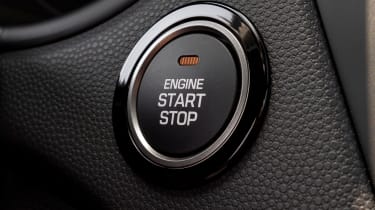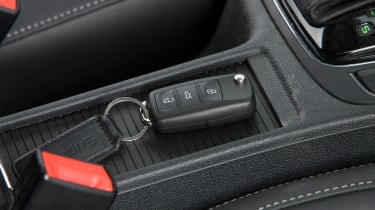How to avoid keyless entry car theft
As cases of keyless car theft spike, find out how you can keep your car secure

The days of thieves defeating car door locks or fishing keys from a letterbox are mostly over as today's criminals have moved towards the high-tech world of electronic deception. Manufacturers are thinking of ever more innovative ways for car buyers to secure their vehicle, but thieves are always looking to circumnavigate the systems for illicit purposes.
The latest Home Office figures show that car theft is on the rise; jumping 48% in the last five years. Insurer LV stated 33% of stolen vehicle claims since 2019 have been for vehicles with keyless entry. It highlights the growing issue of keyless car theft amongst vehicles with the latest security systems.
It isn’t just car thieves who are attempting to defeat keyless entry systems; a number of companies specialising in online security and hacking work to find weaknesses and alert manufacturers in an effort to tackle crime. This gives car manufacturers the chance to strengthen their systems before owners fall victim to theft.
So, what is keyless entry car theft and if you own a car equipped with keyless entry, what can you do to avoid being a victim?
Keyless entry car theft explained
Keyless entry car fobs or cards work by emitting a signal that the car detects when it's a few feet away, allowing you to unlock the doors and start the engine. Thieves can exploit this wireless technology by getting hold of a relay amplifier and transmitter on the black market, then finding a car parked close enough to its owner's house (where the key is).
While one criminal stands by the car with a digital transmitter, a second walks around the perimeter of the house with the amplifier, and if the key is close enough it will detect its signal and send it to the transmitter. At this point the transmitter effectively becomes the key, allowing the thieves to gain access to the car and even drive it away. The whole process can take just seconds and be completed in virtual silence.
The industry is taking notice, however, with Richard Billyeald of Thatcham Research saying: "Manufacturers are already working on new systems. A few new models already have setups that aren't vulnerable to relay attacks. The functionality is the same, but they cannot be fooled by relay devices."
Manufacturers such as Mercedes and BMW have developed motion sensor keys that do not emit a signal whilst the key is stationary, hung on your key hook for instance.
A growing number of cars are foregoing traditional keys entirely, instead using your smartphone to unlock the car using a similar method to a keyless car key. However, these have recently been shown to be just as vulnerable to car thieves with relay devices that can hijack a Bluetooth connection. The car shouldn’t unlock unless the owner’s phone is within three feet of the vehicle, but with a relay plugged into a laptop, hackers have been able to unlock cars from over 60 feet away.

Top tips for avoiding keyless entry car theft
Thieves may be able to take advantage of a vulnerability in car security, but owners can take steps to make it more difficult for hi-tech criminals to carry out keyless car theft. Some of these are simple security steps, while others tackle the issue head on.
Car security basics
Always stick to the basics of car security first. Ensure your vehicle is parked in a well-lit or secure area, properly locked and all valuables are removed. Once in your home or office, ensure your car keys are as far away from doors and windows as possible, preferably shut inside a drawer.
Signal-blocking Faraday pouches
Don't assume that wrapping your key in foil will do a good enough job. It isn't designed for this purpose. As keyless car crime has spiked, several anti-theft pouches have hit the market that are designed to block signals emitted by the key. The idea is simple - keep your key inside the Faraday pouch when not in use, and special material will prevent a relay amplifier from picking up its unique signal and transmitting it. We'd recommend only buying these from a reputable outlet, however, and looking for reviews and accreditation to ensure it will work. Fortunately, good ones aren't too expensive - you can pick them up from auto parts stores or online marketplace sites for under £20.
Switch off the key
The wireless signal from some keyless fobs can be turned off, although the feature isn't always obvious and can require a combination of button presses. Consult the manual or contact the manufacturer to find out if this is possible for the keys to your car.

Switching off the key should certainly thwart keyless car thieves, and could also be recommended when heading off on holiday. It's also worth checking with the manufacturer if any software updates are available, as it may be that a system for preventing keyless car theft has been developed since you got your car.
Physical security measures
As criminals turn to technology, many owners are resorting to low-tech physical security devices like steering wheel locks and driveways with locked gates or barriers. Driveways with a loose stone surface create noisy footsteps and deter criminals as it is impossible to get to the car without making unwanted noise.
Make life difficult for thieves in this way and even if they can unlock the car, hopefully they won't be able to drive away in it. Many criminals will also move on to an easier target when faced with extra security that's time consuming and noisy to defeat.
Tracking devices
It's possible to subscribe to a security company like Tracker, which can fit a tracking device to your car and use it to trace its location if it's stolen. According to the company, 96% of cars fitted with its technology are recovered when stolen, compared with just 50% in other cases.
Not just cars with keyless technology are vulnerable to car crime. Read our top tips guide to car security for more information.
Recommended

Classic car tax exemption: which historic vehicles qualify?
Most Popular
Tips & advice

Car dashboard warning lights: what does each symbol mean?

Electric car charging stations: public networks, charger types, apps and maps










